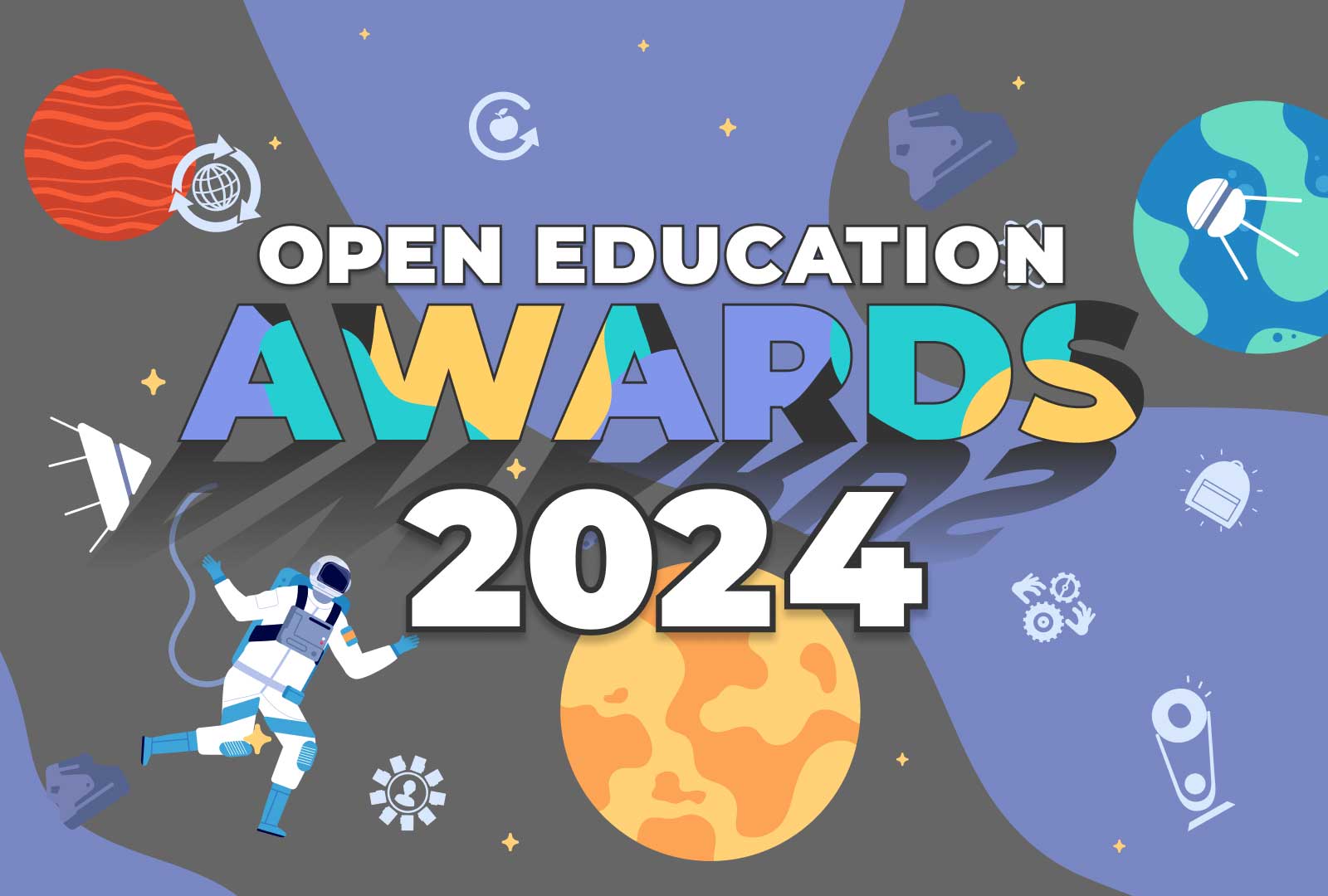We hope you are thinking now of possible people, projects, or resources to nominate for a 2024 Open Education Award for Excellence. The nomination process launches May 13, but you can find guidelines and up-to-date information on the awards web site.
This is the first of a weekly series to highlight the categories to provide some context and inspiration from previous winners aimed to inspire you to think about making a nomination for 2024. We are only able to do this with support of the community to create a pool of nominees and the past winners who volunteer to review the nominations.
Each post in this series will review two of the award categories. For this one we are focussing on the Individual Award given to students since 2018 and the Open Pedagogy awards in the How We Share or Open Practices area.
Focus on the Student Awards

Open Education Resources have long been developed for students but with the evolution of open practices, open pedagogy (see below), starting in 2018 the OE Awards started recognizing students who contributed significantly to not only the creation of OER but shaping practices and policies at their institutions or in their community.
In that first year Natalie Miller won a student award for her work in the California Community College system to both advocate for low cost OER and Zero Textbook Cost Degrees and be part of their development. Also a winner of the student award in 2018, Shifrah Gadamsetti was recognized for her determined use of open resources in her Nursing and Sociology studies at Mount Royal University and participating in student organizations that advocated for open education.
The next year, 2019, a pair of TU Delft students, Bart Meeuwissen & Dirk Ulijn, won the student award for their application of experiences in a student led science project, Hyperloop (still active), in creating the openly licensed MOOC on Hyperloop: Changing the Future of Transportation.
As a energetic advocate of college affordability, Nick Sengstaken won the 2020 student award for substantially impacting textbook policies at University of North Carolina Chapel Hill and being early to criticize the publishers approach of “inclusive access.” Nick has continued on a leadership trajectory in his current role at the UNC Chancellors office as a Transformation Manager.
You learn more about the student awardees in the Awards Hall of Fame including the signifincat OER contributions by University of Edinburgh’s Hannah Rothmann (2021), the advocacy work of Yasser Tamer Atef (American University of Cairo, 2023), and a team of students, Matthew Barkovich, Henry Agnew and Ethan Turner, who played significant role in the development of the LibreTexts platform (2023).
As you can see, these students have made a significant difference by speaking up for OER to fellow students, campus organizations, institution funders and leaders, and also have key contributions in the creation and implementation of open educational resources. Their contributions to education have continued past their degrees and programs.
Do you know students like these who are involved in open education advocacy, OER creation, or open pedagogy? We hope you know of students in your own organizations that should be added to the collection of student awardees and that you make the effort to nominate them for a 2024 Student Award. Are you a student yourself? The awards welcomes self-nominations too. And this is definitely a case where a video adds much to a nomination.
Focus on the Open Pedagogy Awards

In the collection of awards for Open Practices, the Open Pedagogy category makes for the perfect pairing to our first focus on the student awards. This category is important as the growth of Open Education from its early emphasis on resources and content to recognize the ways openness has been included in the broader practice of not only teaching but professional development and organizational practice
Since 2018, seven awards have been given out in Open Pedagogy, in the first year recognizing Red EuLES (Entornos uLearning en Educación Superior) at the University of Zaragoza for its institutional approach to ubiquitous learning and the OER Passport program at Mountain Heights Academy, that applied principles of open education in professional development of open education.
The next year’s award went to the Open Patchbooks developed by Terry Greene, then at Fleming College, as a quilt-like collection of pedagogy practices and skills open contributed by different educators, and later expanded to a second version by and for students. In 2020 the award went to Montgomery College’s United Nations Sustainable Development Goals Open Pedagogy Fellowship program that has significantly expanded currently to an entire network in multiple countries.
In 2021 the Open Pedagogy award recognized the Open Education Challenge series that offered “bite-sized” professional development activities offered by Vancouver Community College and BCcampus. The following year’s award highlighted Penn State University’s Open Pedagogy Road Map that that provides a comprehensive guide for educators to not only develop open pedagogy projects, but how to plan, manage, and implement them.
And just this past year, the award recognized the collaboration of more than 200 students in three departments at the British Columbia Institute of Technology to create Buds, Branch, and Bark an open textbook for winter plant identification.
Are you involved with a current or notable open pedagogy project? Have you seen on in your networks or perhaps saw something during Open Education Week that stands out as a award worth example of open pedagogy in action? We are confident in knowing there are many many more projects and programs out there that exemplify the practices of open pedagogy. You can help elevate more of them to this collection by making a nomination this year in the Open Pedagogy award category.
What’s Next?
This first post of our series in focussing on OE Award Categories is aimed to have you start thinking of students in your own organization and projects/practices that showcase open pedagogy in action. Our goal is to greatly expand the pool of OE Award nominations (last year there were over 170). Again, while we focus on the winners, like last year our goal is to share and give credit to all nominees. Everyone gains from your nomination efforts.
If you have questions or suggestions, you can follow up with us in discussions on these categories (and more) in the Awards space in OEG Connect.
Discuss in OEG Connect
Do you have suggestions or questions about these award categories? We have an open discussion attached to this post.


Have you thought of any students that should be nominated for a 2024 award? Please share as we welcome as well for students to nominate themselves.
And are there some stand out examples of open open pedagogy projects or practices that impress you? Get ready, as nominations open May 13.